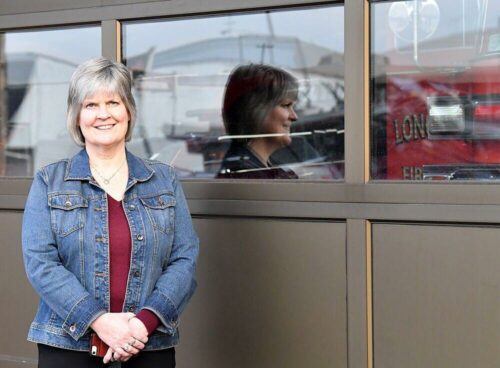
2.26.22 – KHQ
Kris Hauschildt has the same question today she had nine years ago when her parents died from carbon monoxide poisoning in a North Carolina hotel: Why were there no laws to protect her loved ones from a lethal gas leak in a commercial building?
Kris Hauschildt has the same question today she had nine years ago when her parents died from carbon monoxide poisoning in a North Carolina hotel: Why were there no laws to protect her loved ones from a lethal gas leak in a commercial building?
Since the tragedy, Hauschildt of Longview has dedicated her life to ensuring other people don’t unknowingly enter a public building without the ability to detect a carbon monoxide leak.
Carbon monoxide tragedy teaches hazard awareness to Longview students
In the fall, Hauschildt helped update the International Fire Code to include requirements for carbon monoxide detectors in new and existing public buildings with equipment that uses the colorless, odorless gas — places Hauschildt said detectors should have been required all along.
“Our awareness to the fact that they’re not there is missing,” she said. “You think the system is watching out for us. I mean we’re talking about death.”
Changes
The 2024 International Fire Code changes require detectors in new and existing buildings like hotels, motels and apartment buildings with equipment like fireplaces or gas stoves that can leak carbon monoxide, said Longview Fire Marshal Jon Dunaway.
Hauschildt wrote one draft of the code herself, then worked with industry experts to create the final version.
The changes Hauschildt petitioned for will have to be adopted by each individualized state’s Legislature, which could take years, Dunaway added.
Each state has individualized statutes based on the International Fire Code — a set of minimum requirements that are updated every three years to protect people from hazards like fires and carbon monoxide poisoning.
As of 2018, 14 states require carbon monoxide detectors in hotels and motels, according to the National Conference of State Legislatures. Five states requires them in schools.
Dunaway said he can’t remember a time when Washington state hadn’t adopted updated International Fire Codes and called the changes an obvious need.
“If the hazard exists, there should be some way to protect people from that hazard,” Dunaway said.
Looking for solutions
Hauschildt formed a 501(C)(3) called the Jenkins Foundation in honor of her parents with the mission to prevent further deaths and injuries from carbon monoxide poisoning.
Daryl Jenkins, 73, and Shirley Jenkins, 72, of Longview were visiting relatives in Boone, North Carolina in the spring of 2013 when they were found unresponsive in an independently owned Best Western hotel, Hauschildt said.
A probe into the cause of the Jenkins’ death was slow moving, she added, and about seven weeks later an 11-year-old died in the same hotel room and his mother suffered permanent brain injury.
Investigators found a corroded pool heater located beneath the room was leaking carbon monoxide and no detector was installed, reports The Seattle Times.

The findings were another blow to Hauschildt: The deaths could have been prevented, if they had known of the lack of regulations, she said. Her mother had worked at a natural gas company for 30 years and knew how to protect herself in her home with a detector, Hauschildt added. Now, Hauschildt said she carries a portable alarm.
“If you want to be safe, make sure you have an alarm with you,” she said.
Hauschildt said she works fulltime at her foundation to ensure her loss isn’t repeated. Earlier this month, a grant from the Jenkins Foundation supplied 50 carbon monoxide detectors for Cowlitz County fire departments to disseminate to the public. Dunaway said Longview’s share of 30 detectors was handed out in two hours.
To Dunaway, the demand signifies more people need protection from and education about the lethal gas. Hauschildt said she also believes people don’t understand how quickly carbon monoxide can kill.
Longview activist warns of carbon monoxide dangers on anniversary of parents’ deaths
The Daily News reported in 2018 that Hauschildt settled with the North Carolina hotel owner for $4.5 million, but Hauschildt said solutions to the broken system would be more valuable.
“It’s very difficult to walk away from this issue and not try to fix it,” she said. “It’s not a fair system to a family. We want to hear ‘hey, we fixed it and it’s not going to happen to the next person.’”
This article originally ran on tdn.com.
